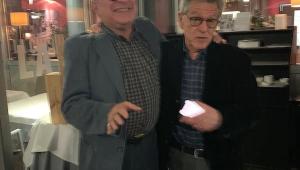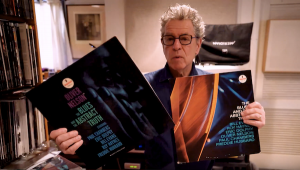Janis might not be aware of this or does not remember, but Boxstar (now Cisco) did a vinyl reissue of Between The Lines in 2011 cut by Kevin Gray from 'Original Analog tapes'.
Janis Ian Sheds Some Inner Light on Following Her Analog Roots When Mastering New Music for Vinyl

All Ian photos in this story courtesy Shock Ink.
“It’s nice to talk analog. You’re speaking my language.” That’s Janis Ian, the iconoclast singer/songwriter who’s made a lifetime-slash-career out of breaking barriers and forging new paths when it comes to making music that is equal parts folk, country, rock, and all points in between. And she’s very much speaking our language too, of course.
Yes, her breakout 1966 single on Verve, “Society’s Child,” gave everyone notice Ian was a songwriting force to be reckoned with, later reinforced in depth via the full breadth of the subject-matter flex on March 1975’s chart-topping Between the Lines LP on Columbia, and quite especially its No. 3 single “At Seventeen,” an outcast’s ballad-anthem as resonant now in terms of the level of modern, younger-gen societal interactivity — or lack thereof — as ever.
Taking more control over her music as the years went by, Ian has achieved another career high point with her current LP The Light at the End of the Line (Rude Girl Records), which was finally released on vinyl in December 2022 even though the CD and digital versions were out almost a full year earlier in January 2022. Essentially a collection of live takes wherein, as the liner notes put it, “all vocals [were] recorded live without editing,” Light was mastered by Piper Payne at Infrasonic Sound in Nashville, and the album was pressed by A to Z Media. Why the staggered release dates? “We ran into the Covid issue, because it was supposed to come out all at once,” Ian explains. “And then we got backed up by two months, and then it was three months, and then Adele came out [with 30, in November 2021], and on and on it went.” (Such is the LP-pressing life these days, alas.)
As of this posting, The Light at the End of the Line is also up for a Grammy Award for Best Folk Album, and the Grammys will broadcast live on February 5 on CBS broadcast TV as well as be streamed live on Paramount+. Ian’s recent awards-oriented track record is quite good, in fact, as just yesterday (on February 1, that is), she received the Elaine Weissman Lifetime Achievement Award at the 2023 International Folk Music Awards (IFMA) in Kansas City, Missouri on the opening night of the Folk Alliance International’s 35th annual conference, where she also took home Artist of the Year honors. “I’m stunned,” Ian observed quite succinctly about these nominations/wins.
We’re not stunned at all, Janis, given all the cumulative sonic rewards apparent in the collective body of your work. A few weeks prior to that impending Grammys broadcast, Ian, 71, and I got on the phone to discuss the making of Light, the importance of evaluating test pressings, and how she applies analog-oriented principles to catalog reissues regardless of the format. Better times will come / When the world learns to live as one. . .

Mike Mettler: Even from an audiophile viewpoint, I do actually like hearing vocal humanity on vinyl, like I’m hearing on The Light at the End of the Line LP. Considering the arc of your career, the idea of focusing on humanity since Day 1 has been kind of a calling card for you, I think. You’d agree with that, right?
Janis Ian: Yes, and that’s a great way to put it. I’d never thought of it that way. I think that was part of the goal with this album. But I had an embarrassing moment early on (chuckles), because my friend Jeff Evans, who has been archiving my music for decades now, said, “Look, you ought to listen to some of these work tapes. You really should.” Some of those work tapes are the things that later went on the record — and it was embarrassing because, on those work tapes, almost inevitably, the vocals were better, even after when I had worked and worked and worked on them.
And on this album, I thought, “Okay, even if there’s one vocal where I’m a little flat for a heartbeat, then you know what? I’m not gonna pitch-correct that. I’m not gonna mess with it. It just is what it is.” It’s live — and there you go.
Mettler: Well, speaking as somebody who likes getting that kind of thing on albums, there are certain records where you’ll hear somebody take a long breath before they sing a syllable or a line that is going to have some sort of clear impact to it. And I prefer that being left in there because, depending on the lyrical content, it leads me to pay more attention to what’s coming next. Know what I mean?
Ian: Absolutely! And it’s reality. I think it’s a very basic engineering mistake that young engineers make — especially now with home studios where they’ve got digital editing, and they cut off everything just before the word begins. And if that breath’s not in there, it doesn’t sound real.
Mettler: Right? Even on a song that’s as insanely popular as the Eagles’ “Hotel California” [the title track to their iconic December 1976 LP], if you listen super-carefully, at the end of the line where Don Henley sings all the way through the long second vowel on the word “alibis,” you can actually hear the edit before he finished singing the word. I mean, this is a song people have heard multiple-millions of times, but somebody got too precious in the studio about that edit.
Ian: Yes — and that’s a real danger, though. It’s one of the reasons I went with Piper [Payne] for mastering this album, because we didn’t record it all-analog the way that I was able to with [1993’s] Breaking Silence. I said to her, “This is a compendium of different formats — but it’s live. It feels like it’s real, and I don’t want to lose any of that. I don’t wanna clean it up.” I think there’s one song where you can even hear a bird in the background, or a dog barking.
Mettler: That’s funny, because when I was playing the LP, I thought it was something I was hearing that was happening outside my house. (laughs)
Ian: No, I was singing into a DAT player in my living room.
Mettler: Interesting. You really captured the reality of the moment there.
Ian: That’s right.
Mettler: I hope you don’t mind me asking, but does the bird get royalties? I mean, you gotta cover all the bases, right?
Ian: (laughs heartily) Absolutely!
Mettler: Anyway, I was happy to see you’re selling some of the test pressings for your albums on your website store . I noticed you had a note on one of the test pressings for The Light at the End of the Line album that says something like, “Check possible distortion on Track 3,” or maybe it was Track 5. Can you recall what that notation was about? [MM adds: That particular test pressing has apparently been sold during the interim between the time of our interview and this posting.]
Ian: You know, I can’t remember it exactly, but there was something where it was bothering me, and — oh, I know what it was. It was on the song (Ian sings), “Paint the walls in fairy tales” — “Wherever Good Dreams Go,” which I wrote for a friend whose son had died.
That song was live. That’s a live recording. But hearing the applause was very jarring, so we had to get rid of the applause. And, in getting rid of the applause — which was no mean feat — we noticed that there was a little spit, or something. Piper tried to ease it up and we tried to pull it out, and I finally said, “You know what? Just leave it. Just leave it be.” I just wanted to make sure that it hadn’t been emphasized when we went to vinyl.
Mettler: That’s good. Well, I’m glad you have such QC in place for what you’re doing for vinyl.
Ian: I mean, my personal preference is tape, period — end of discussion. Whether it’s magnetic tape, or — I’d even prefer DAT than playing music through a computer.
Mettler: What about reel-to-reel? Do you still have any reel-to-reels around?
Ian: I don’t anymore. All of that stuff went to Berea. All my stereo gear, my old JBL Century 100s [i.e., her speakers], my Marantz tuner — all of that is with Berea now. [Back in early December 2022, Ian announced she had donated her personal archives, which included all sorts of vintage gear and stereo equipment, Which will be displayed as part of the Janis Ian Archives at Berea College in Berea, Kentucky.]

Mettler: Well, I guess that’s okay, because it’s all very archivally important. I think I’m going to have to take a field trip there at some point.
Ian: Yes. And they’ll be able to set it up so people can see what I was working with. Anyway, when I needed to check out those test pressings, I went to a friend’s house, an audiophile who has huge speakers and a very expensive system. And then I also went to another friend who’s got just one of those little record players like I had when I was a kid — you know, the one with a speaker, and everything — and I checked it on both.
Mettler: Since you knew you were doing vinyl right away for the Light album, did you play with the sequencing at all, or was this the order of the set, or. . .?
Ian: No — it fell into place. It just did. I think this was the easiest album I’ve ever made. I mean, it was complicated because of Covid. Like doing “Better Times Will Come,” and coordinating all those people on it, and doing “Resist,” and having to do that long distance. But I think it all came out better in a way, because I wasn’t around to interfere! (laughs)
It just came together like it was supposed to come together. It was really simple. I don’t mean to make light of the work that went into it because a lot of work went into it — but I was shocked at, in looking at the songs, how the sequencing made sense. Couldn’t end [Side B] with “The Light at the End of the Line” — I had to end with “Better Times Will Come.” And I couldn’t open [Side A] with either of them — I had to open with “I’m Still Standing.” That made sense. Everything about it just made sense.

Even the cover. It’s a shot a photographer in Ireland [Niall Fennessy] took as I was leaving a gig, and it’s the only picture he took of me. We’ve had it hanging in the house forever. I emailed him and said, “Niall, can I use that for my album cover?” And he said, “Yeah.” The black-and-white, me-as-now cover — it made sense then to do a color, me-as-then for the back cover. It all just fell in, luckily.

Mettler: It’s one of those perfect-symmetry things. And I’m glad you made mention of choosing your final track to be “Better Times Will Come.” I think you had recently said something about — oh, who was it, Nina Simone? It was when she was asked about sad songs, and she said something to the effect of like, “Well, they all have hope.”
Ian: It was Billie Holiday. She said, “Every one of my songs has hope.”
Mettler: That’s right, Billie Holiday. I feel like that was your message here — that you started in a certain way, and you gave us the true bookends of the record, “I’m Still Standing” and “Better Times Will Come,” because we got all this bleep in life in the middle.
Ian: Yeah, all this stuff needs to be fixed. All this stuff needs to change. But it will — it will. I have absolute faith that it will.
Mettler: I hope so too. You had also mentioned “Resist,” where there’s a little bit of an echo effect on your vocal there. And that’s a deliberate choice, right? Because a lot of other songs here are very stark, just like you and a guitar and/or a piano.
Ian: Yeah, super-dry.
Mettler: Why is that? Just because of the subject?
Ian: Yeah, “Resist” is a different kettle of fish. It’s a different kind of song than the rest of the record. To me, “Resist” and “Better Times Will Come” are the bookends, because they’re the only two full-band songs on the album.
Even with something like “Swannanoa,” you’ve got just three instruments and two vocals. But on “Resist,” we went all-out, and I wanted the vocal to sound like it made sense with the track.
Mettler: It totally fits the bigger-picture vibe. And, I dunno, but for some reason — and maybe it was just because of some of the lyrics — but to me, I almost feel like “Resist” is kind of like “At Seventeen” x-number of years later.
Ian: Oh, absolutely! Absolutely.
Mettler: Before we get into that song a little bit more, you know you’re now at the perfect palindrome age, right? You’re 71, so you now have 17 and 71 juxtaposed in your life.
Ian: (laughs heartily) Oh my God! That’s scary.
Mettler: (chuckles) Sorry, I didn’t mean to interrupt your thought there about the lyrical parallels.
Ian: No, that’s okay. When I was performing it, I would often say in front of “Resist” that I didn’t know for sure, but if I was writing “At Seventeen” now, this is probably what I would’ve written.
Mettler: Wow. Well, it’s an interesting thread. And if we can talk about “At Seventeen” for a moment, we also have the new Between the Lines CD, the album that song comes from that’s not on new vinyl yet — and I do want to ask you about why that is. But first, I have to say I’m glad that you did a lot of Between the Lines QC with some very smart people like [reissue producer] Steve Berkowitz.
Ian: Yeah. Berkowitz is great. He’s amazing.
Mettler: He really is. I hosted some panels with Steve on them, where we were talking about The Beatles in mono — but that’s a story for another time. Tell me a little bit about the work process on Between the Lines, because you had Brooks Arthur involved for a little bit before he passed. [Arthur was the original producer and co-engineer on Between the Lines. He passed away at age 86 in October 2022.]
Ian: Brooks was involved a lot, in every one of the reissues. We did five reissues with Sony, and then we redid Between the Lines, and Brooks was involved from start to finish — even on the ones he hadn’t produced or engineered, because I really valued his ears.
Steve [Berkowitz] and I had often talked about what a shame it was that Sony had put out Between the Lines as, I think, their second CD ever after [Bruce Springsteen’s] Born to Run in 1983, and what a shame it was that they were still selling that version! It made me crazy, because vinyl doesn’t automatically translate to CD, as you know.
So, Steve intervened with Sony, and I begged and got permission to — because I own Between the Lines in certain territories, and they own it in others — I got permission to press a certain, very limited number, and to recreate it.
And then I called Brooks and I said, “Would you be part of this again, because Steve and I only have the ears we have, but you’re the one who really was the engineer?” And then the big decision was, do we go after what it would sound like if Brooks was recording it now, or what it would sound like if we’d had all this equipment then [i.e., in 1974-75], or what it would sound like if we wanted to make a completely different record and just throw everything else out?
Brooks decided the thing to do — and we agreed with him — was to go for the best of what we could have done then. And that was to keep it analog, and keep it true to its analog roots — not turn around and feed the whole thing into a digital makeup and remix everything. But at the same time, we’d get rid of things like — as you know, every time you play tape, it degrades. We were working from first-generation [master tapes], but we were still working from something that had been played three or four times.
Brooks had a safety [master] that had never been played — or at least some of it hadn’t — and we were able to incorporate that, and then we were able to use technology to bring back some of the life of the magnetic particles that we felt it had lost over the years.
And then, we were able to redo the cover art, which had made me crazy for decades! I had a fan who had an absolute pristine, never-opened copy, and she was kind enough to send us that copy so the art director could match the colors — and that made all the difference too.

Mettler: I totally get that. What, you didn’t want to replicate that perfect ringwear halo around your head that a lot of people have on their original 1975 Columbia LP copies like I do? (Ian laughs heartily) Now, I do agree that it really does sound great digitally, but I do have to ask you — are you going to be allowed to do a vinyl pressing with the new Between the Lines mix at some point?
Ian: You know, honestly, at this point, I’m so tired of negotiating with people. I haven’t even thought about it. It’s an idea, and I’m sure Sony would agree to let me do it.

Mettler: Well, I hope that can happen someday soon. I mean, I do still have my original ringwear version (laughs), and I have the 2018 European edition too.
Ian: Yeah, we did a UK remaster [on vinyl] — but we haven’t done a really definitive, from-analog-source perfect one at this point.
Mettler: Whenever that more perfect analog reissue LP happens, we’ll have to talk again. Okay, I know you have to jump, so two last things. First, do you have a favorite vinyl record, of anything you’ve ever listened to?
Ian: (no hesitation) Oh, Steely Dan, Aja. [Aja, originally released on ABC Records in September 1977, will soon enough be getting a high-quality UHQR vinyl reissue from Analogue Productions.]
Mettler: Wonderful choice. The solo sequence between drummer Steve Gadd and [tenor saxophonist] Wayne Shorter, playing off of each other. . .
Ian: (interjects) Oh my God, yeah! It’s really, really, really good, absolutely.
Mettler: Approved! (laughs) That’s one of my favorite on-vinyl moments ever. All right, last thing, since you have to go. I’m gonna project ourselves into the future. I like to do this with pretty much everyone I talk with, so let’s roll 50 years down the line, to 2073. Most likely, you and I are not on the planet unless science does something weird. We’re probably not here, but if some person, however they listen to music in that year, cues up the name “Janis Ian,” what do you want them to get out of that experience?
Ian: Heart. (slight pause) That would be plenty.
Mettler: Ah, that’s beautiful. It’s in the grooves, it’s in the winter, and it’s in the stars, as I think the line goes.
Ian: That’s right. And if it’s not in those places, then it’s nowhere.

JANIS IAN
THE LIGHT AT THE END OF THE LINE
1LP (Rude Girl Records)
Side A
1. I’m Still Standing
2. Resist
3. Stranger
4. Swannanoa
5. Wherever Good Dreams Go
6. Perfect Little Girl
Side B
1. Nina
2. Dancing With The Dark
3. Dark Side Of The Sun
4. The Light At The End Of The Line
5. Better Times Will Come
- Log in or register to post comments























































